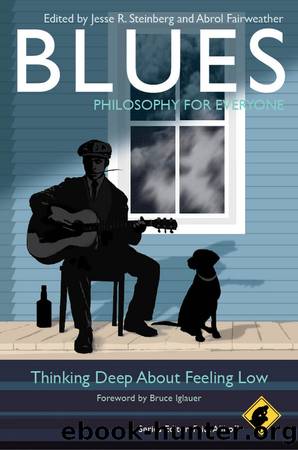Blues--Philosophy for Everyone by Fritz Allhoff & Abrol Fairweather

Author:Fritz Allhoff & Abrol Fairweather
Language: eng
Format: epub
Publisher: Wiley
Published: 2011-11-06T16:00:00+00:00
PART 3
IF IT WEREN’T FOR BAD LUCK, I WOULDN’T HAVE NO LUCK AT ALL: BLUES AND THE HUMAN CONDITION
BRIAN DOMINO
CHAPTER 9
WHY CAN’T WE BE SATISFIED?
Blues is Knowin’ How to Cope
Introduction
A few years after the Rolling Stones’ now classic if awkwardly titled ‘(I Can’t Get No) Satisfaction’ reached number one, Mick Jagger was asked whether he was any more satisfied. Jagger responded ‘Sexually, d’you mean, or philosophically?’ The answer of ‘both’ elicited ‘Sexually – more satisfied; financially – dissatisfied; philosophically – trying.’ The journalist followed with ‘Are you sadder but wiser?’ Jagger apparently heard ‘or’ instead of ‘but’ since he answered ‘wiser.’1
I don’t know why Jagger answered as he did. I would like to think it was because he had an unparalleled view of a question that confronts us all; namely, should you follow your emotions or reason? After all, Jagger was, and is, the frontman for the most popular blues band of all time. Many regarded him as thoughtful and introspective. Indeed, decades later, television’s Gregory House, M. D. referred to ‘the philosopher Jagger’ on the eponymous show. With these credentials, it seems reasonable to assume that Jagger is profoundly aware of the tension between the emotions and reason. That’s why he can discuss sex and money in terms of satisfaction and dissatisfaction, which are chiefly emotional terms, while his philosophical efforts involve mental activity – ‘trying.’ Jagger chose a particularly apt word since ‘trying’ also describes something that is difficult or hard to endure, as the project of being ruled by reason is. Lastly, Jagger’s appreciation of the tension between emotions and reason explains his separation of sadness from wisdom, since to be wise means not to be sad.
Before working on this essay, this choice did not confront me as crisply as I am imagining it confronted Sir Jagger. Certainly there were isolated moments when I could sense a battle being waged between my emotions and reason. But I didn’t fully appreciate the broader version of this question – the version that demands that one decides what force will rule one’s life. Should this question seem merely academic, recall your worst choices and best moments. Chances are, they all involved the emotions. We tend to make poor choices when we’re angry, hurt, or even madly in love, and our best moments are when we are happiest, or proudest, or when we feel most relieved or grateful. Even if one of your happiest memories is finally understanding how integral calculus works, or some such intellectual victory, you’re probably remembering the feeling of mastery or relief or the satisfaction of your efforts paying off rather than the pure intellectual moment. These are all emotional responses. Keep your worst and best moments in mind for a little longer. Suppose you could all but eliminate the worst moments from your life. Would you? The catch is that the best must go, too. So you’d be trading life’s vicissitudes for flatline stability. Would you do it?
This is not an idle question. You can actually
Download
This site does not store any files on its server. We only index and link to content provided by other sites. Please contact the content providers to delete copyright contents if any and email us, we'll remove relevant links or contents immediately.
How to Do Nothing by Jenny Odell(2645)
A Forest Journey by John Perlin(2588)
The Plant Messiah by Carlos Magdalena(2454)
Babylon's Ark by Lawrence Anthony(2070)
Energy Myths and Realities by Vaclav Smil(2061)
The ESV Study Bible by Crossway Bibles(1915)
Abbey in America by Murray John A(1801)
Fatal Storm by Rob Mundle(1788)
Witness Tree by Lynda V. Mapes(1694)
Shadows on the Gulf by Rowan Jacobsen(1516)
Client Earth by James Thornton(1501)
Brokeback Mountain by Annie Proulx(1471)
Coming Back to Life by Joanna Macy(1466)
Water Rights and the Environment in the United States by John Burch(1414)
Cosmos by Carl Sagan(1400)
Ten Billion by Stephen Emmott(1383)
Mycelium Running: How Mushrooms Can Help Save the World by Paul Stamets(1286)
The overachievers by Robbins Alexandra(1285)
The Uninhabitable Earth by David Wallace-Wells;(1193)
